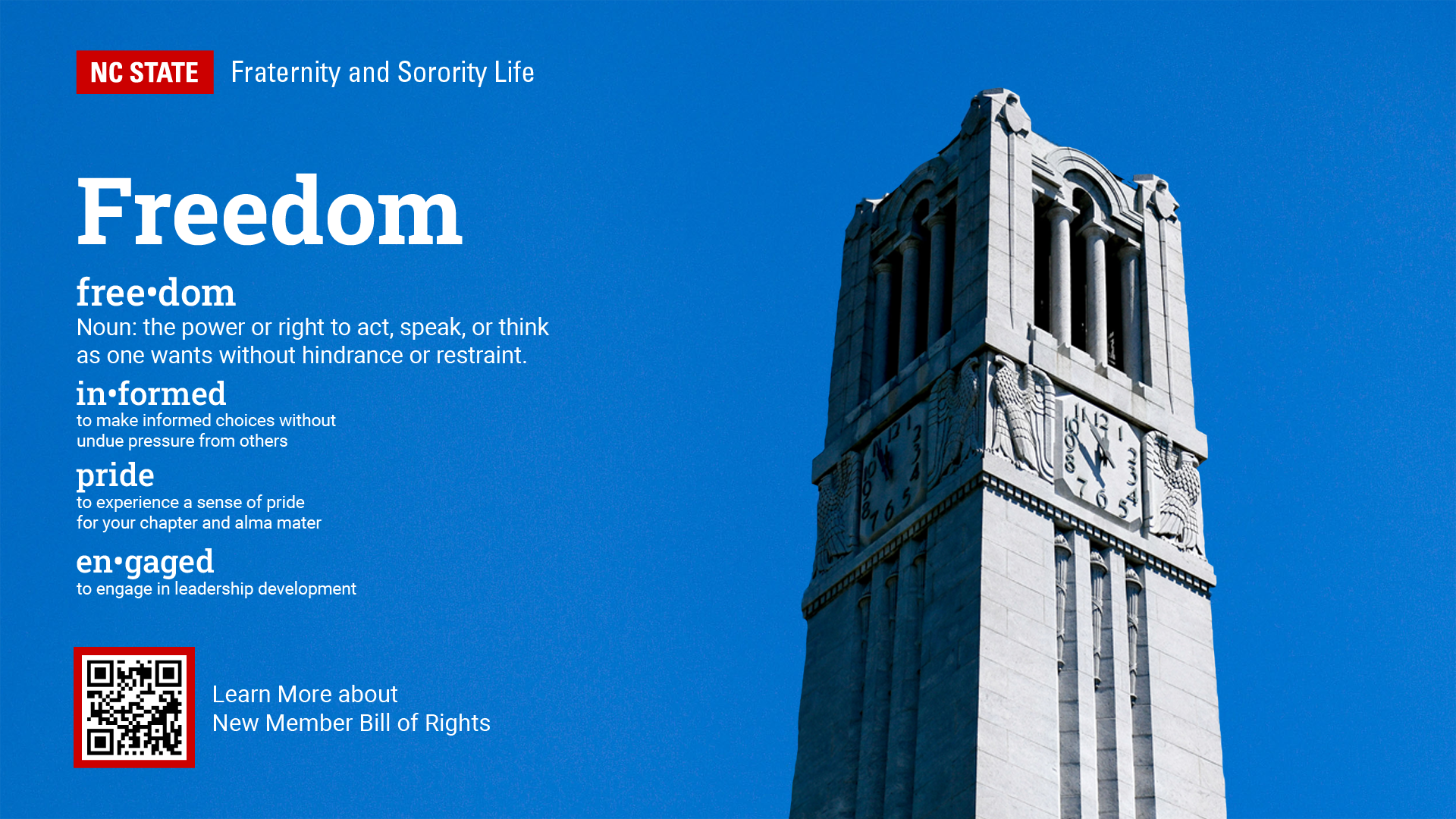New Member Bill of Rights
Each new member has the right to partake in an enriching fraternal experience reflective of the values of NC State University which include:
Integrity in the pursuit, creation, application, and dissemination of knowledge
You have the right to experience a new member process that is consistent with the institutional mission of NC State and you have the right to ask questions and receive accurate and objective answers from members.
Freedom of thought and expression
You have the right to engage in leadership development opportunities and explore your individual leadership potential. Additionally, you have the right to experience a sense of pride for one’s chapter and alma mater and to make informed choices without undue pressure from others.
Community for engagement and awareness through fellowship
At NC State, you have the right to experience a genuine sense of brotherhood/sisterhood and are encouraged to engage with alumni in mentoring and/or advisory capacities.
Collaboration for individual actions and service to society
You have the right to a new member process that encourages your mental and physical well-being, and the right to develop and/or enhance healthy social skills.
Sustainability for consistent growth in economic and natural resources
You have the right to be fully informed about the membership process, costs, requirements and time obligations. You also have a right to a new member process which encourages active participation in meaningful service for the community.
Inclusion for cultural and intellectual diversity
At NC State, you have the right to maintain and improve relationships with others beyond one’s affiliation and to build awareness and appreciation for your fraternity or sorority history.
Excellence in all endeavors
You have the right to have a positive, safe and inspiring new member education process and the right to new member activities which reflect the value of scholarship. You also have the right to receive assistance in developing and/or pursuing career goals.







Violations
To this end, no new member shall be coerced by any person or persons to abandon or tolerate a violation of their rights. Whether consent is provided or not, the following requests are not appropriate for any new member educational activities. Such requests include any act which:
- Violates the values of NC State University, and/or the values of the fraternity or sorority
- Interferes with academic responsibilities; including activities that cause you to be unprepared, late, or absent for class
- Places you in physical danger or harm
- Subjects you to “sub-human” or cruel treatment
- Subjects you to embarrassment and/or ridicule; including requiring you to wear costumes and/or participate in demeaning acts
- Subjects you to harassment, bullying, or intimidation by any collegiate or alumni members
- Requires you to participate in activities between 11 p.m. – 9 a.m.
- Requires you to participate in mandatory designated driver duties
- Requires you to perform personal acts of service or “favors,” for collegiate or alumni members
- Requires you to participate in “line-ups”
- Requires you to carry items you would not normally bear (including paddles, bricks, signature books)
- Requires you to participate in activities that are prohibited by federal, state, and/or local laws; including illegal use of alcohol and drugs
This list is in no way exhaustive.
Any questions regarding violations of new members’ rights or other questionable activities, including hazing, should be reported to FSL at 919.513.2910. You may ask to speak with Shelly Brown Dobek, Director. Sources are kept in confidence.
Hazing Defined
Behavior related to organizational membership or potential membership, regardless of consent or intentionality, that meets two or more of the following:
- Is inconsistent with the purpose of the organization;
- Is negligent or reckless in nature;
- Introduces risk factors;
- Increases vulnerability factors;
- Unreasonably interferes with academic activities or success
| Risk factors include: (perpetration) | Vulnerability factors include: (victimization) |
|
|
Hazing Prevention
Providing education, resources, prevention strategies, and reporting mechanisms for students, faculty, staff, parents and families of students at NC State. Learn more >